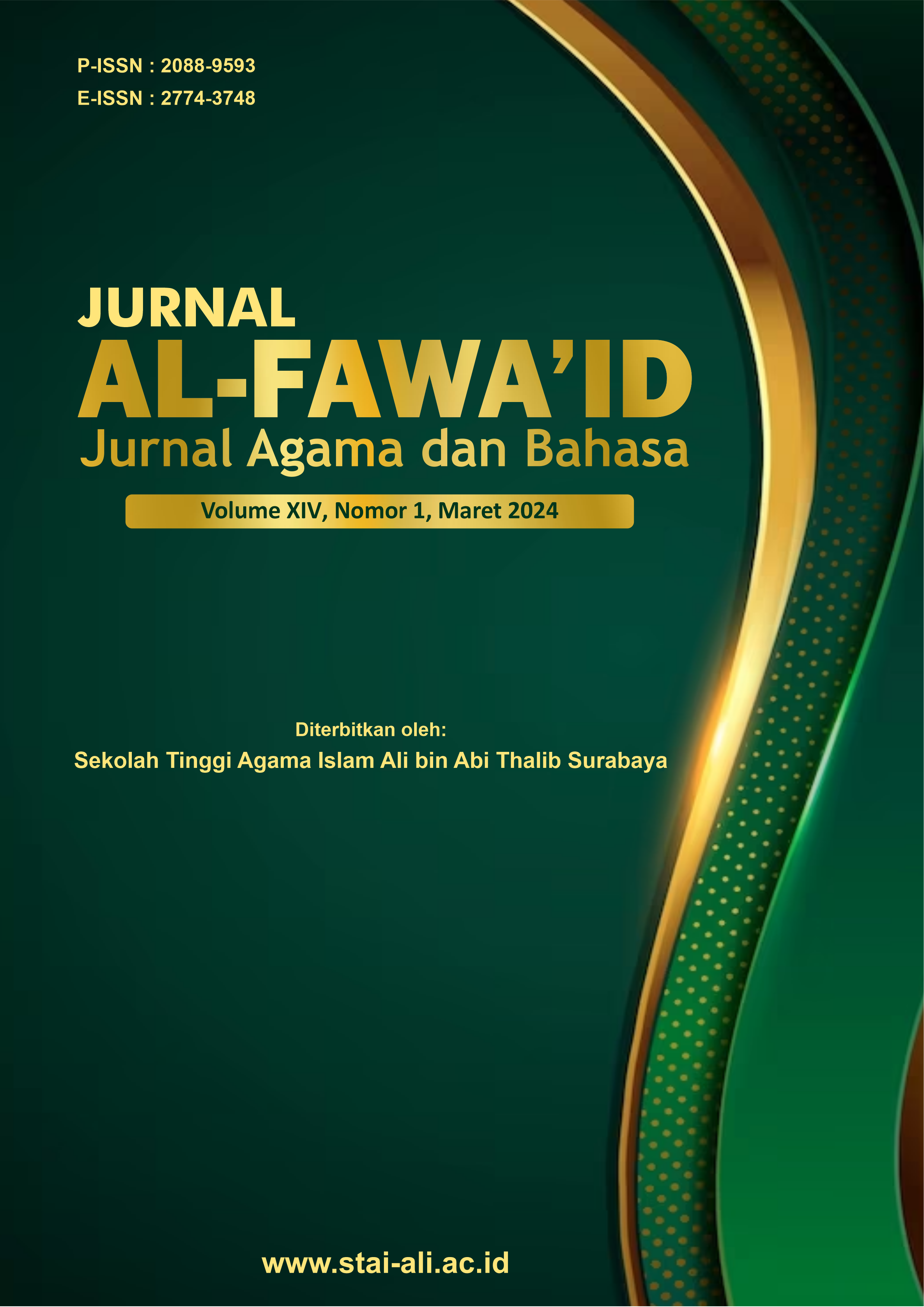Problematika Heterogenitas Latar Belakang Pendidikan dalam Pembelajaran Bahasa Arab di Ma’had Al Ihsan Surabaya
Authors
Reksi Dinda Lukmana
Nadlir
Ali Wafa
This study aims to describe (1) the problems of learning Arabic caused by the heterogeneity of the educational background of the students, (2) the problems experienced by non-Islamic boarding school students in the learning process and their efforts to achieve the target of learning Arabic, and (3) the efforts teachers address the problems that occur in the process of learning Arabic. The method used in this research is descriptive qualitative type. The subjects in this study were two Ma'had Al Ihsan Surabaya teachers and six new students. The background of this research is that there are problems experienced by several new students of Ma'had Al Ihsan Surabaya, especially non-Islamic boarding school students, in the process of learning Arabic in class. The results showed that (1) the various educational backgrounds of the students greatly influenced the level of quality of their understanding of Arabic lessons (2) the constraints of non-Islamic boarding school students in mastering Arabic, which consisted of factors of interest, educational background, difficulties in adjusting, delays in learning, lack of confidence, laziness and anxiety. As for the efforts made by non-Islamic boarding school students to be able to achieve the target of learning Arabic, namely studying with friends and increasing study time outside class hours (3) efforts made by ustadz to strengthen students' ability to speak, namely forming study groups both in class and outside outside of class, holding additional classes, holding additional activities every Saturday morning, giving additional assignments and creating a mandatory environment in Arabic.
Abdullah, A. (2018). Berbagai Metodologi dalam Penelitian Pendidikan dan Manajemen. Gunadarma Ilmu.
Amirudin, N. (2017). PROBLEMATIKA PEMBELAJARAN BAHASA ARAB. TAMADDUN, 1–12. https://doi.org/10.30587/tamaddun.v0i0.66
Estari, A. W. (2020). Pentingnya Memahami Karakteristik Peserta Didik dalam Proses Pembelajaran. Social, Humanities, and Educational Studies (SHES): Conference Series, 3(3), Article 3. https://doi.org/10.20961/shes.v3i3.56953
Hamdi, S., & Abadi, A. M. (2014). PENGARUH MOTIVASI, SELF-EFFICACY DAN LATAR BELAKANG PENDIDIKAN TERHADAP PRESTASI MATEMATIKA MAHASISWA PGSD STKIP-H DAN PGMI IAIH. Jurnal Riset Pendidikan Matematika, 1(1), Article 1. https://doi.org/10.21831/jrpm.v1i1.2666
Hasrati, H., Afiah, N., & Yulmiati, Y. (2021). Pengaruh Minat Belajar Terhadap Hasil Belajar Peserta Didik Pada Mata Pelajaran Bahasa Arab di MIS Ma’arif Ambopadang Kecamatan Tubbi Taramanu Kabupaten Polewali Mandar. Loghat Arabi : Jurnal Bahasa Arab dan Pendidikan Bahasa Arab, 2(1), Article 1. https://doi.org/10.36915/la.v2i1.22
Hermawan, A. (2019). MENGETAHUI KARAKTERISTIK PESERTA DIDIK UNTUK MEMAKSIMALKAN PEMBELAJARAN.
Indriawati, P. (2018). PENGARUH KEPERCAYAAN DIRI DAN KECERDASAN EMOSIONAL TERHADAP HASIL BELAJAR MAHASISWA FKIP UNIVERSITAS BALIKPAPAN. JURNAL DIMENSI, 7(1). https://doi.org/10.33373/dms.v7i1.1633
Karim, B. A. (2020). Teori Kepribadian dan Perbedaan Individu. Education and Learning Journal, 1(1), Article 1. https://doi.org/10.33096/eljour.v1i1.45
Khumairoh, R. (2020). ANALISIS HUBUNGAN LATAR BELAKANG PENDIDIKAN DENGAN KEMAMPUAN BERBICARA BAHASA ARAB SISWA KELAS X MAN 2 KOTA MALANG. International Conference of Students on Arabic Language, 4(0), Article 0.
Munawaroh, S. (2016). MODEL PEMBELAJARAN KOOPERATIF (COOPERATIVE LEARNING) DALAM STRATEGI BELAJAR MENGAJAR BAHASA ARAB. Prosiding Konferensi Nasional Bahasa Arab, 1(2), Article 2. http://prosiding.arab-um.com/index.php/konasbara/article/view/35
Nasution, N. C. (2018). DUKUNGAN TEMAN SEBAYA DALAM MENINGKATKAN MOTIVASI BELAJAR. Al-Hikmah, 12(2). https://doi.org/10.24260/al-hikmah.v12i2.1135
Nurhamidah, I. (2018). Problematika kompetensi pedagogik guru terhadap karakteristik peserta didik. Jurnal Teori Dan Praksis Pembelajaran IPS, 0, Article 0.
Salim, S., & Syahrum, S. (2012). Metode Penelitian Kualitatif (kelima). Citapustaka Media.
Setiyawan, A. (2018). PROBLEMATIKA KERAGAMAN LATAR BELAKANG PENDIDIKAN MAHASISWA DAN KEBIJAKAN PROGRAM PEMBELAJARAN BAHASA ARAB. ARABIYAT : Jurnal Pendidikan Bahasa Arab dan Kebahasaaraban, 5, 19.
Shubchan, M. A., & Rossa, M. A. (2021). MEMAHAMI LATAR BELAKANG PENDIDIKAN PESERTA DIDIK: TELAAH TENTANG TRANSFER DAN TRANSFORMASI BELAJAR. Perspektif, 1(2), Article 2. https://doi.org/10.53947/perspekt.v1i2.60
Takdir, T. (2020). PROBLEMATIKA PEMBELAJARAN BAHASA ARAB. Naskhi: Jurnal Kajian Pendidikan Dan Bahasa Arab, 2(1), Article 1. https://doi.org/10.47435/naskhi.v2i1.290
Tim Informasi MAI. (2020). Profil. Ma’had Al Ihsan Surabaya. https://www.mahadalihsan.com/profil/
Tungkagi, F. M., Ali, I., & Kasan, Y. (2022). PROBLEMATIKA PEMBELAJARAN BAHASA ARAB PADA MAHASISWA LULUSAN NON-MADRASAH DI PRODI PENDIDIKAN BAHASA ARAB IAIN SULTAN AMAI GORONTALO. Al-Fakkaar, 3(1), Article 1. https://doi.org/10.52166/alf.v3i1.2854
Turhusna, D., & Solatun, S. (2020). Perbedaan Individu dalam Proses Pembelajaran. AS-SABIQUN, 2(1), Article 1. https://doi.org/10.36088/assabiqun.v2i1.613
Warif, M. (2019). Strategi Guru Kelas dalam Menghadapi Peserta Didik yang Malas Belajar. TARBAWI : Jurnal Pendidikan Agama Islam, 4(01), Article 01. https://doi.org/10.26618/jtw.v4i01.2130
Yuliawan, A. (2016). HUBUNGAN ANTARA MOTIVASI BELAJAR DAN LATAR BELAKANG PENDIDIKAN DENGAN PRESTASI BELAJAR MAHASISWA. Profesi (Profesional Islam) : Media Publikasi Penelitian, 14(1), Article 1. https://doi.org/10.26576/profesi.132
Article Sidebar
Copyright (c) 2024 Reksi Dinda Lukmana, Nadlir, Ali Wafa

This work is licensed under a Creative Commons Attribution 4.0 International License.

